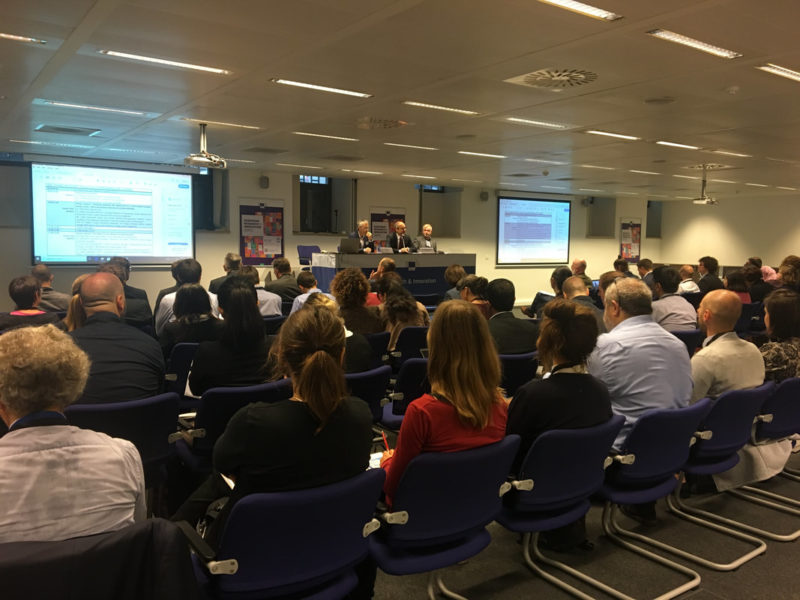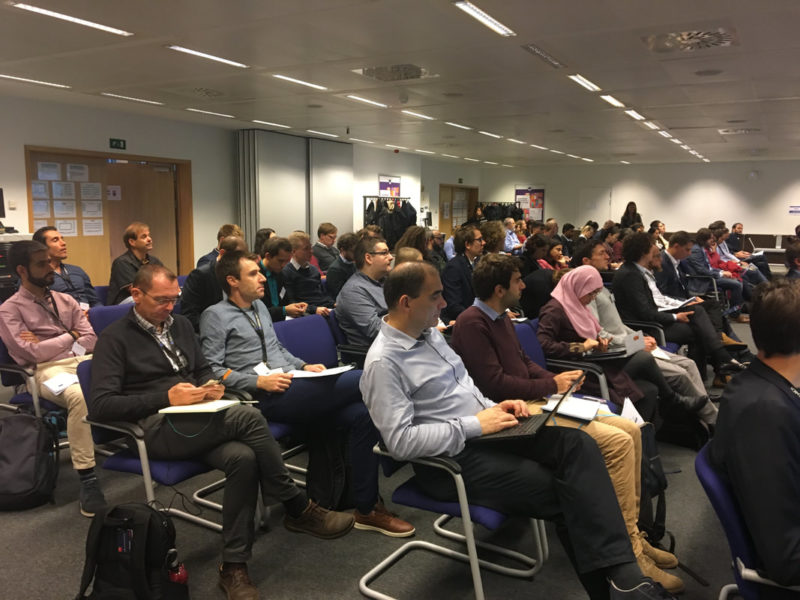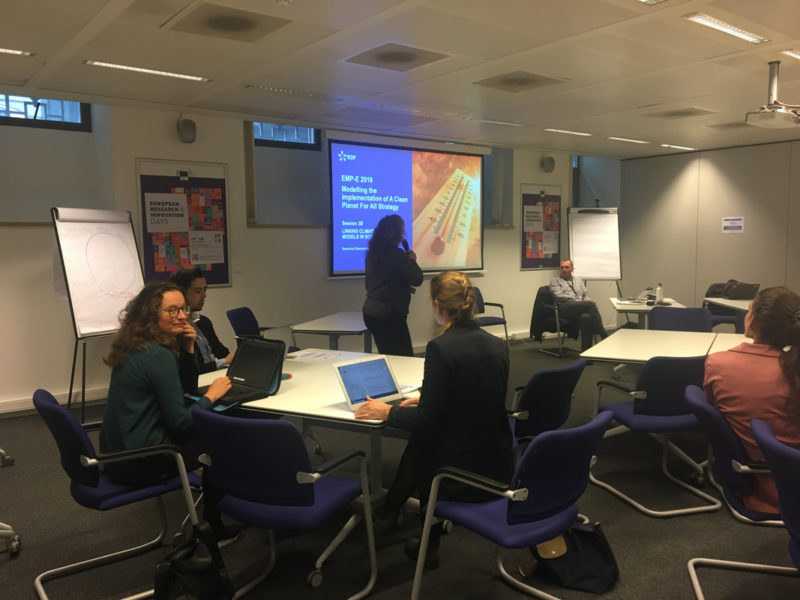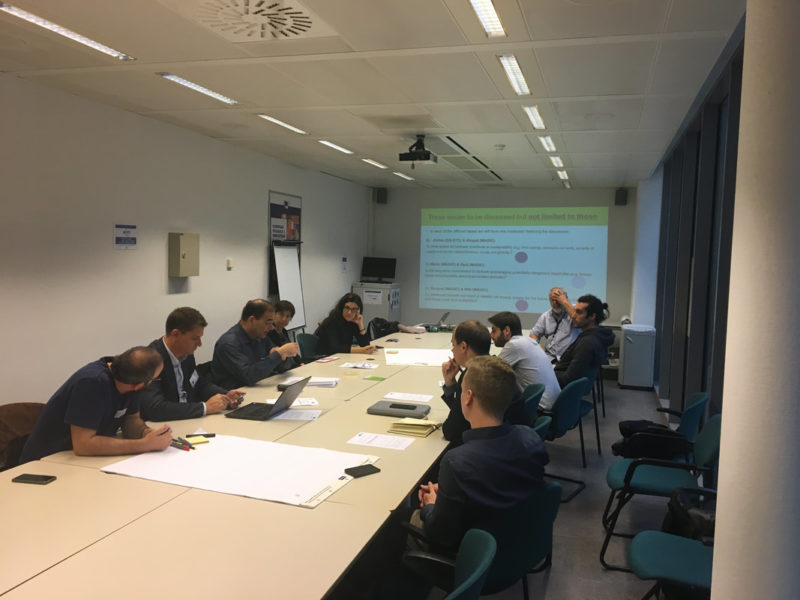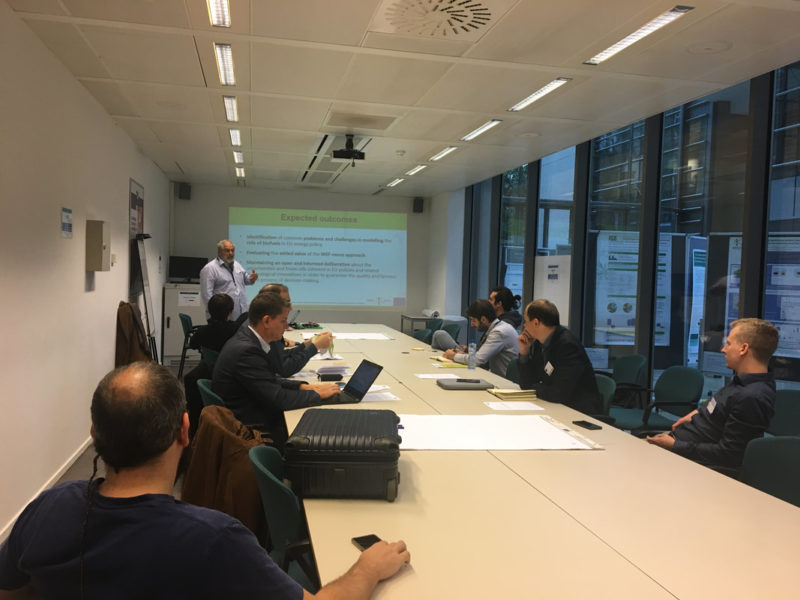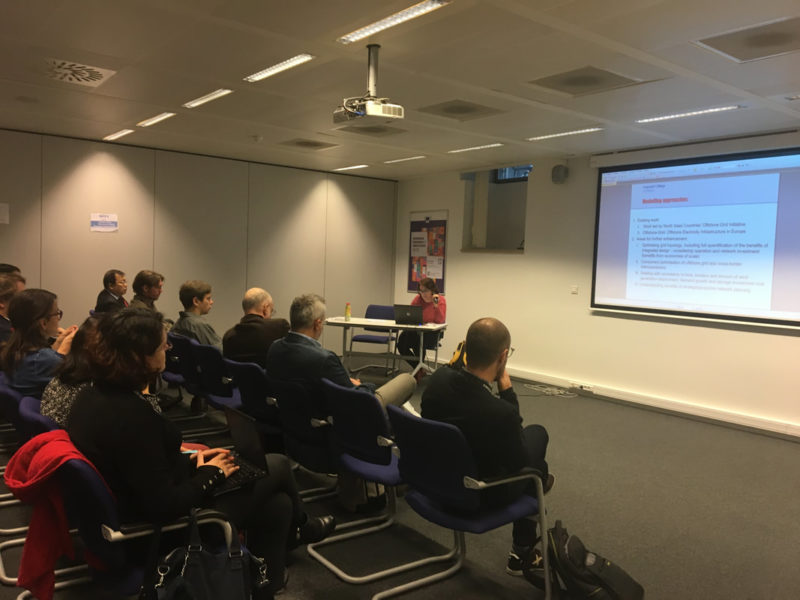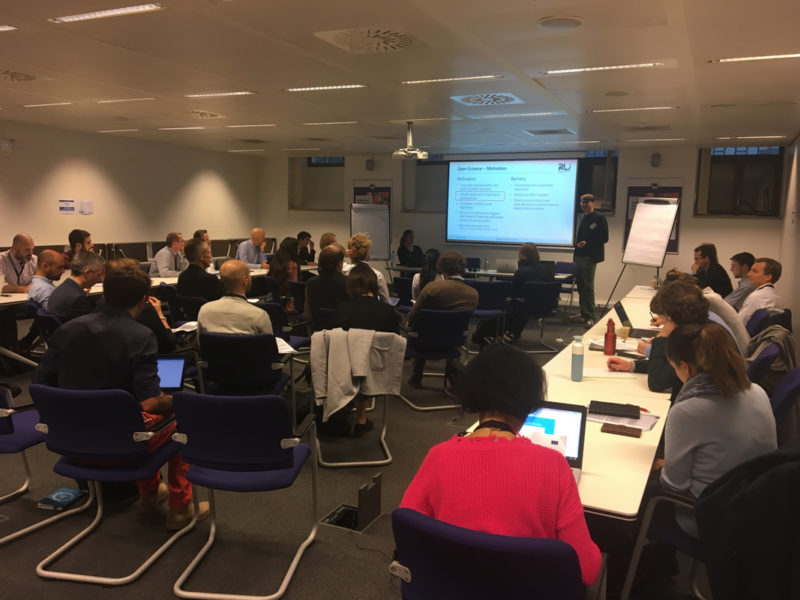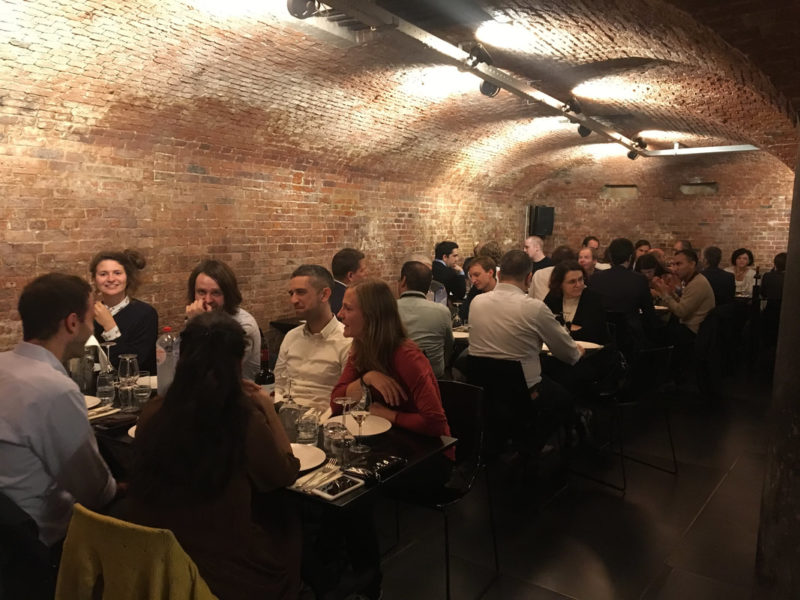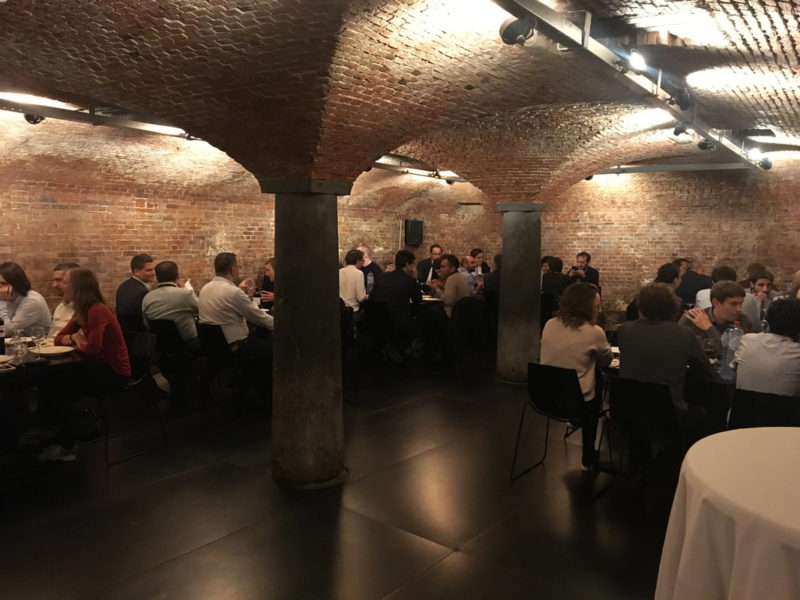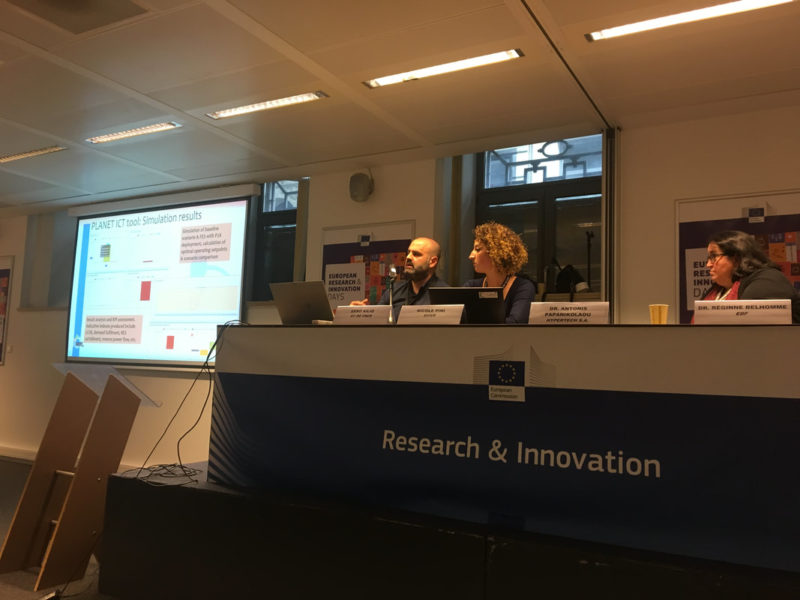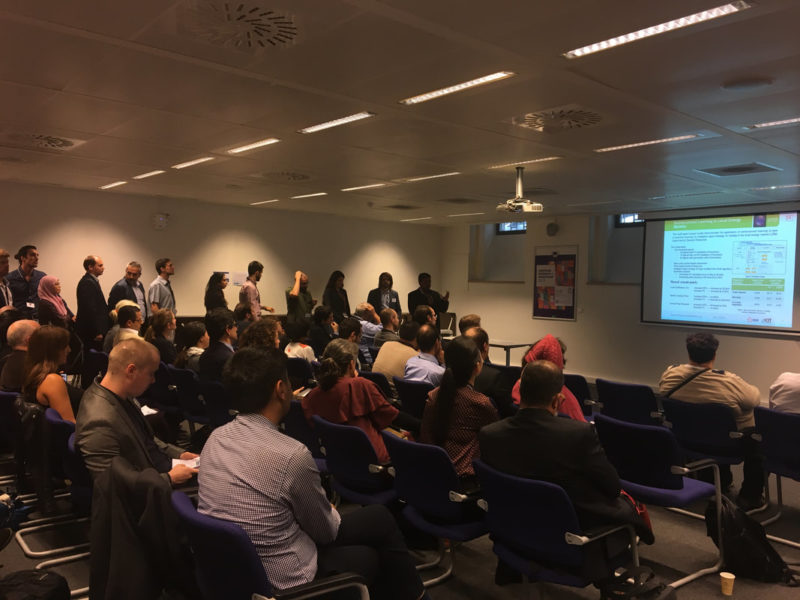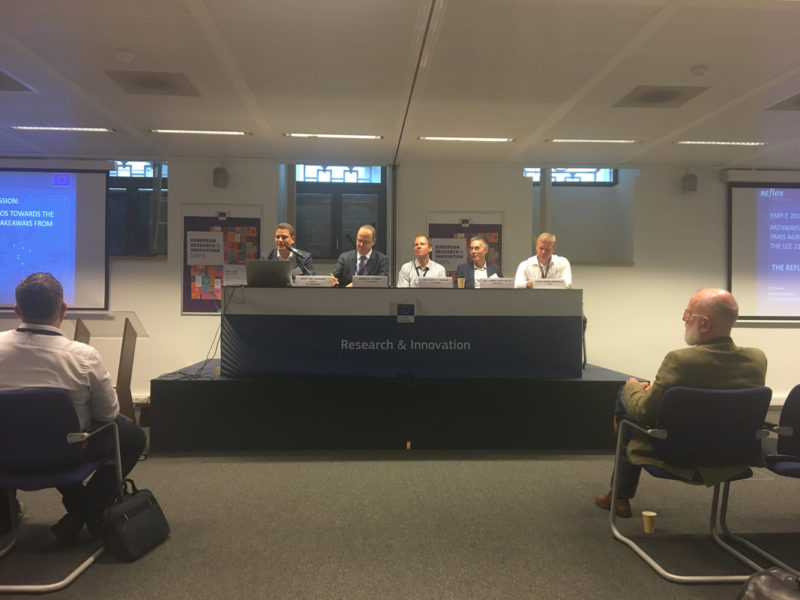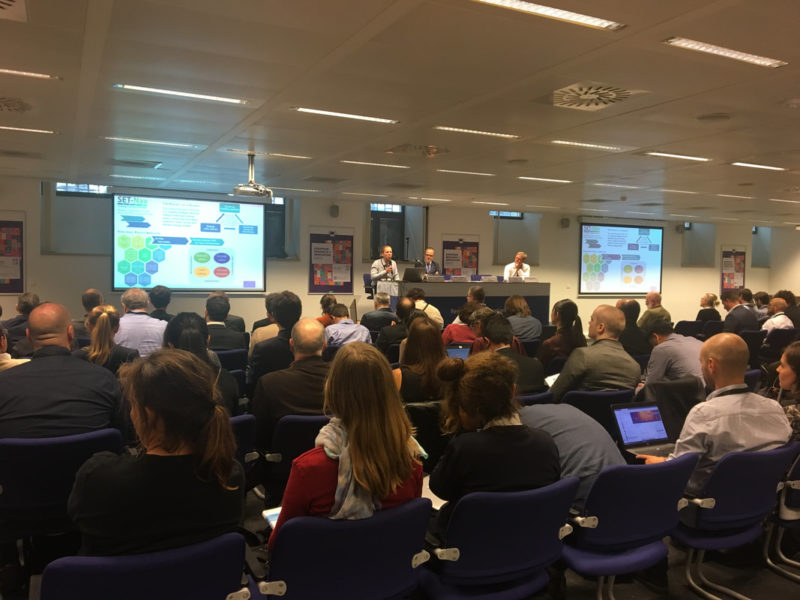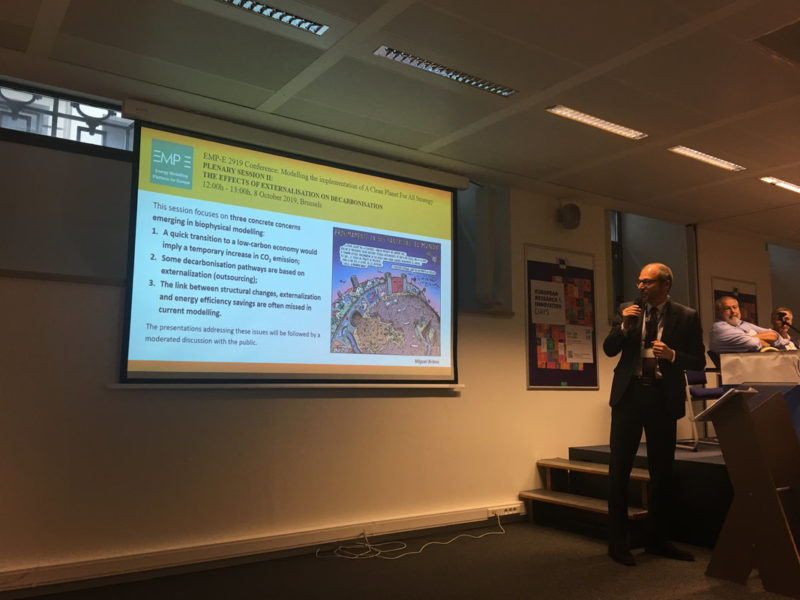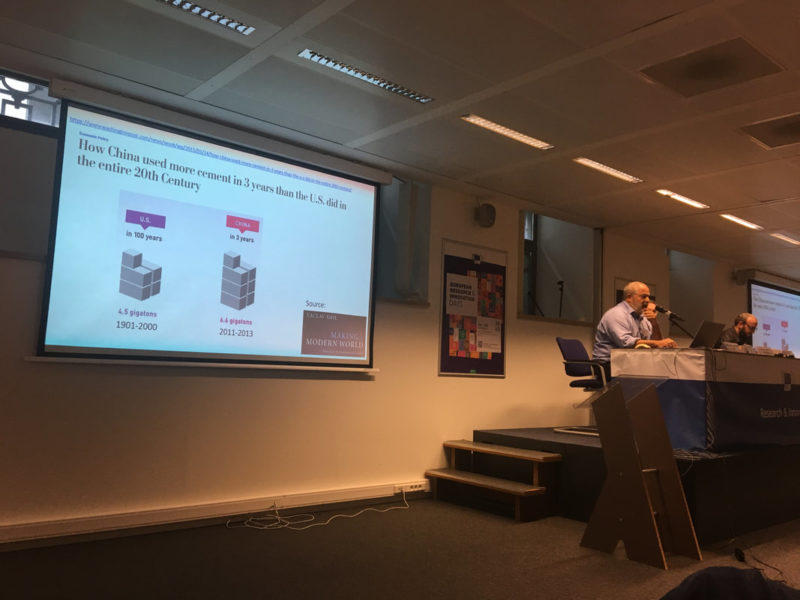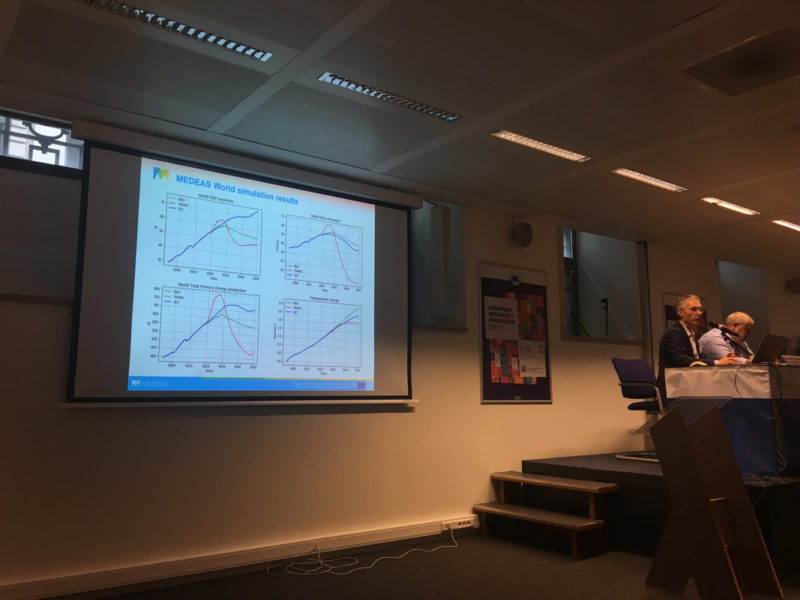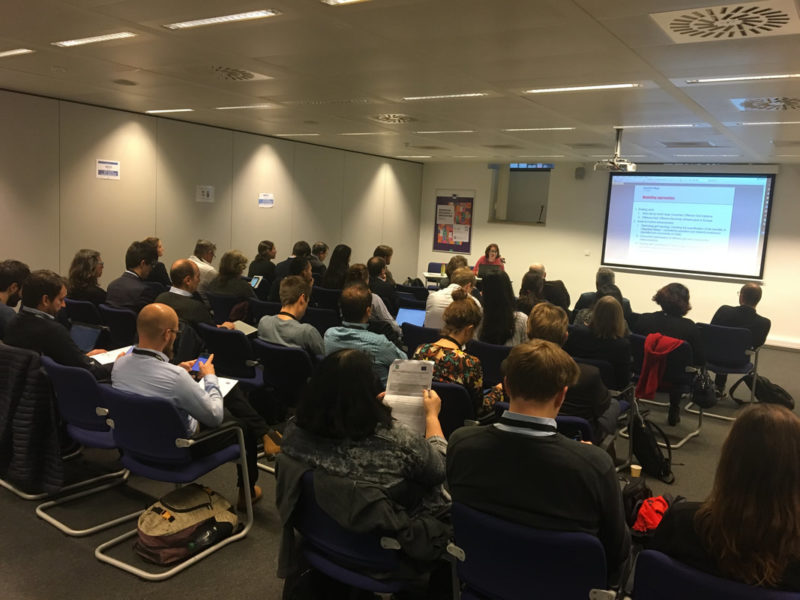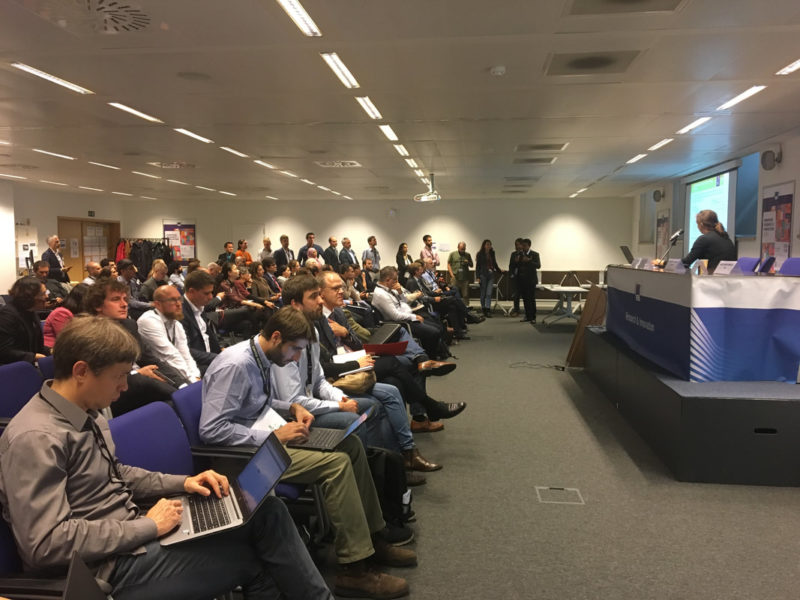EMP-E Conference 2019
Modelling the implementation of A Clean Planet For All Strategy
October 8-9 2019
EC Headquarters, 21 Rue du champ de Mars – Marsveldstraat, 1050 Brussels
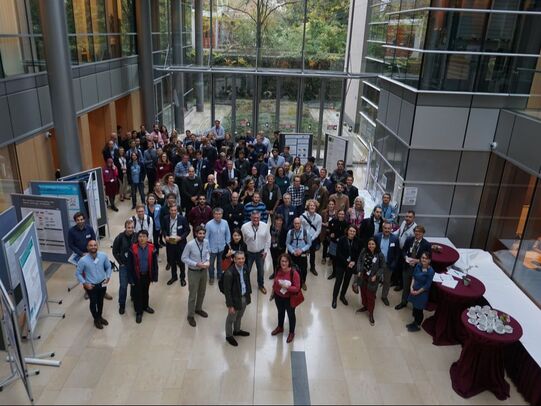
The H2020 Energy modelling group, consisting of nine Horizon 2020 projects funded by the European Commission’s Research and Innovation Programme, is pleased to announce the Third Meeting of the Energy Modelling Platform for Europe (EMP-E) 2019, hosted on October 8th and 9th by the European Commission DG Research & Innovation in Brussels.
The agenda of the Energy Modelling Platform 2019 meeting covered the following topics:
- Pathways and scenarios towards the Paris agreement,
- Decarbonisation of cities: modelling energy transition, sector coupling and cross-sectoral challenges,
- Investments as a key factor to RES implementation in the EU and
- The effects of externalisation on decarbonisation pathways.
EMP-E 2019 focus groups covered the following topics
- Behavioural aspects in energy system models
- Linking climate and energy models in scenario analysis
Key outputs of the meeting will be published after a peer-review process in a Special Issue of the Journal Energy Strategy Reviews (Elsevier)
Special Issue of Energy Strategy Reviews (Elsevier)
Modelling the implementation of A Clean Planet For All Strategy – Output from the Energy Modelling Platform for Europe (EMP-E) 2019
This Special Issue collects contributions from accepted poster presentations for EMP-E 2019.
It intends to constitute a peer-reviewed digest of models, approaches and policy insights for the assessment of Clean energy pathways for the EU energy system vis-à-vis the Energy Union strategy. The content of the Special Issue will cover four key themes, aligned with the themes of EMP-E 2019:
- Modelling techniques
- Behavioural aspects and the role of citizens and local authorities in energy modelling,
- Energy and climate strategy, targets and scenarios,
- Investments and RES deployment.
Contributions are welcome on either of the four themes, providing methodological overviews or model applications, with related policy-relevant insights. For more information of poster abstract submission, kindly see here.
We remind you that Energy Strategy Reviews is now a Gold Open Access journal. More information about publication policy and publication fees can be found here.
Contacts
For further information and queries, please contact: Special-IssueEMP-E@medeas.eu
Programme
Day 1 October 8th, 2019
| 08.30 – 09.30 | Arrival and Set-Up / Installation of Posters Poster presenters shall set up their A0 poster on the poster boards located in the atrium. The placement of the posters can be done upon arrival and freely, depending on the availabilities of the present poster boards. Location: DG RTD, CDMA Building, Atrium |
| 09:30 – 10:00 | Welcome & Introduction Dr. Philippe Tulkens (European Commission, DG RTD) Dr. Jordi Solé Ollé (ICM-CSIC – Institut de Ciències del Mar) Andreas Zucker (European Commission, DG ENER) Location: DG RTD, CDMA Building, SDR1 and SDR2 |
| 10:00 – 11:00 | Plenary Session I: Achieving ambitious res deployment in a multi-coupled european energy system – techno-economic, financial and societal challenges Session Chair: Dr. Dieter Most (Siemens AG) Speaker I: Dr. Robert Schroeder (ENTSO-E – European Network of Transmission System Operators for Electricity): “Power system: pivotal for RES and sector integration” Speaker II: Julian Steinmeyer (Open Grid Europe GmbH / Forschungcampus MODAL): “Sector coupling as the accelerator required for successful energy system transformation” Speaker III: Prof. Dr. Stefan C. Aykut (University Hamburg): “An energy transition without societal change? Blind spots in the current debate on ‘energy system integration’” Description: European research projects like REFLEX and plan4res underline the need for a significant expansion of renewable energy sources to enable a cross-sectoral electrification for the decarbonisation of the European energy system. The integration of these mainly weather dependent energy sources can be realized by available flexibility option including power-to-x technologies for sector coupling. Nevertheless, the aim to reduce emissions in the European energy system is not only a techno-economical challenge, but also arises questions about financial and societal framework conditions necessary to realize the ambitious transformation. The role of different stakeholders in different energy sectors (electricity, gas, heating, transport) will change substantially in a multi-coupled low-carbon European energy system. Acceptance, not only for new technologies, but also for energy policy goals and measures in general, becomes crucial to maintain political support and to enable a reconciliation of interests of the public in Europe. Against this background the plenary session brings together perspectives from industry, policy and society to identify and discuss key challenges regarding the complex European energy system transformation. Contact information: Sandrine Charousset, Christoph Zoephel, Steffi Schreiber Location: DG RTD, CDMA Building, SDR1 and SDR2 |
| 11:00 – 11:30 | Poster sneak-peek I The poster presenters of Day 1 stand and each one presents in 1 minute her/his poster in the plenary session. Slides of Sneak Peek I Poster of sneak peek I: 1-9, 10, 11-19 Location: DG RTD, CDMA Building, SDR1 and SDR2 |
| 12:00 – 13:00 | Plenary Session II: The Effects of Externalisation on Decarbonisation Session chair: Raúl Velasco Fernandez (Universitat Autònoma de Barcelona) Speaker I: Dr. Alessandro Antimiani (European Commission, DG Trade): “Trade and climate change: issues and modeling” Speaker II: Dr. Jordi Solé Ollé (Institut de Ciències del Mar – ICM-CSIC, Barcelona): ‘Renewable Transition and ‘Energy Cannibalism’: Net energy and energy payback time’ Speaker III: Dr. Philippe Tulkens (European Commission, DG RTD): “Climate and Planetary Boundaries” Speaker IV: Dr. Mario Giampietro (Universitat Autònoma de Barcelona – ICREA): “Modelling the effects of structural changes and terms of trade” Description: This session focuses on three concrete concerns emerging in biophysical modelling: A quick transition to a low-carbon economy will imply a temporary increase in CO2 emissions; Some decarbonisation pathways are based on externalisation (outsourcing); The link between structural changes, externalisation and energy efficiency savings are often missed in current modelling. The plenary presentations addressing these issues will be followed by a moderated discussion with the public. Download program here. Format: Brief introduction to the session and four plenary presentations followed by a moderated panel discussion with the public. Contact information: Raúl Velasco Fernandez and Roger Samsó Location: DG RTD, CDMA Building, SDR1 and SDR2 |
| 14:30 – 15:30 | Plenary Session III: Panel discussion on pathways and scenarios towards the Paris agreement – Lessons learnt and key takeaway messages from the H2020 LCE21 Projects Moderator: Alban Kitous (DG Clima, European Commission – tbc) Panelists: Mark Howells (KTH Royal Institute of Technology – REEEM) Gustav Resch (TU Wien – SET-Nav) Jordi Solé Ollé (ICM-CSIC – MEDEAS) Dominik Möst (TU Dresden – REflex) The session consists in a semi-structured panel discussion among representatives of the four projects funded under the H2020 call LCE21-2015 and the audience, moderated by the European Commission’s Directorate Generals for Climate and for Energy. The discussion focuses on the policy insights and the final outcomes of the four projects and on how these can support the achievement of the goals of the new Long Term Strategy and the Paris Agreement. Contacts: Gustav Resch, Jasper Geipel, Francesco Gardumi Location: DG RTD, CDMA Building, SDR1 and SDR2 |
| 16:30 – 17:30 | Plenary Session iv: Decarbonisation of cities – Modelling energy transition, sector coupling and cross-sectoral challenges Session chair: Nicole Pini (EIFER – European Institute for Energy Research) Speaker I: Eero Ailio (European Commission, DG Energy): “Cities helping deliver energy transition, what is at stake?” Speaker II: Dr. Antonis Papanikolaou (Hypertech S.A.): “The PLANET Network Orchestration tool to simulate the future energy flows” Speaker III: Dr. Régine Belhomme (EDF – Électricité de France): “The MAGNITUDE project: opportunities offered by enhanced synergies between electricity, gas and heat systems” Speaker IV: Georgios Zazias (E3-Modelling): “Modelling sectoral integration and sectoral coupling in view of climate neutrality” Description: This plenary session will help to define and present the modelling problems that we are facing for decarbonisation of cities taking into account energy transition, sector coupling and the associated challenges. We will discuss the main dimensions of the models and the optimisation simulations to be successfully carried out. In particular, the session will focus on how to take into account the different levels involved (technological, organisational, market, business, societal); the different energy sectors and how they interact; the stakeholders, their roles, interactions, strategies and optimisation processes; the articulation between the local level (city) and global level (regional, national, maybe also European) and above all, how to build scenarios for the future. Format: 3-4 presentations with Q&A, general overview to the topic Contact information: Nicole Pini, Regine Belhomme, Mariapia Martino, Hanna Launonen, Vasiliki Katsiki Location: DG RTD, CDMA Building, SDR1 and SDR2 |
| 18:00 – 18:30 | Closing Session: Wrap up and discussion of topics for EMP-E 2020 Dr. Jordi Solé Ollé (ICM-CSIC – Institut de Ciències del Mar) Dr. Ingebor Graabak (SINTEF Energi) Location: DG RTD, CDMA Building, SDR1 and SDR2 |
| 19:30 – 23:00 | Conference Dinner Location: Strofilia, Rue du Marché aux Porcs 11-13, 1000 Bruxelles |
Day 2 October 9th, 2020
| 09:30 – 11:15 | Parallel session 1A: energy system models – transparency, community-based and citizen participation Session chair: Berit Müller (DGS – German Society for Solar Energy) With inputs to the discussion from: Speaker I: Sabine Haas (RLI – Reiner Lemoine Institut (GRECO project, POV Citizen Science): Energy system simulations and Citizen Science approaches in the project GRECO Speaker II: Josh Roberts (REScoop.eu): The voice of citizens in the European energy transition debate Speaker III: Ludwig Hülk (RLI – Reiner Lemoine Institut (Open Energy Projects (open_x), OpenEnergyPlatform & StEmp (Stakeholder Empowerment) – Tools “POV Open Science”)): The tools to bring more transparency in the technical part of the discussion about the energy system transformation Description: Subjects to be discussed: How can research for European energy transition become community-based? How can Open Science and Citizen Science fertilise each other? How can Open Scientists become good curators for Citizen Science? How can we reach citizen participation in policy making processes in the field of energy planning? How can Citizen Science and interested citizens support the research of scientists? What are the barriers? What are the key elements? Where can we find best practices and how do we apply these to energy system research? Format: Inputs by projects with experience in Open Science and Citizen Science for 30 minutes. The practical format will be a Fish-bowl discussion, ie. A panel that starts with the speakers and (one or two) moderator(s) plus two empty seats that can be taken by anyone who wants to talk. The moderator(s) will bring the prepared points into the discussion. Contact information: Berit Müller, Dr. Jordi Solé Ollé |
| 09:30 – 11:15 | Parallel session 1B: Uncertainty in energy system models Session chairs: Dr. Danny Pudjianto (Imperial College London), Edoardo Corsetti (RSE – Ricerca Sistema Energetico) Keynote speakers: Wim van Ackooij (EDF – Électricité de France) and Dr. Paola Falugi (Imperial College London): “How to deal with uncertainty for pan-European electricity system planning and operation modelling” Edoardo Corsetti (RSE – Ricerca Sistema Energetico): ”Uncertainty in the management of MES” Description: This session will be focused on the analysis of the main uncertainties that impact energy system(s). Different kinds of energy systems will be included, from very local systems (eg. neighborhood) to the whole European energy system, for different energy vectors. All time horizons will be dealt with, from very short term (close to real time) to very long term (eg 30 years). All kinds of uncertainties may be studied: physical short term uncertainties (temperature, wind, hydro inflows, failures), market related uncertainties (prices, volumes), long-term uncertainties (climate, regulation, market design, technology costs), human-behavior, data availability. The objective of the session will be to build a mapping of uncertainties and try to answer the following questions: What are the main impacts of uncertainties? How uncertainties can be taken into account in energy models? What are the most promising solving methods? Session attendees will be invited to present their view about the important uncertainties to include in the future that are not today dealt with and the most promising methodologies. Format: Short introduction (10 min) by chairman describing the ‘where we are today’ and introducing main discussion topics 1 or 2 Synthesis talks (20 min) Short presentations (2 min each) by attendees Magdalena Stüber, “Uncertainty modeling with the open source framework urbs” Roger Samsó, “Methodology for Stability, Uncertainty and Sensitivity analysis applicable to energy models” W. van Ackooij, “Uncertainty in Energy Systems” Irene Danti Lopez, “Flexibility requirements and modelling complexity needs within power system unit commitment formulations” Interactive discussion focused on building the mapping and highlighting priorities Contact information: Sandrine Charousset |
| 09:30 – 11:15 | Parallel session 1C: WEF nexus in energy models – the case of biofuel Session chairs : Mario Giampietro (Universitat Autònoma de Barcelona/ICREA), Maddalena Ripa (Universitat Autònoma de Barcelona) Description: This session aims at a critical examination of the uncertainties, trade-offs and controversies surrounding the role of biofuels in decarbonisation objectives using a biophysical perspective based on the water-energy-food-land-climate nexus. The discussion will be informed by the results of the Horizon2020 research project MAGIC – Moving to Adaptive Governance in Complexity: Informing Nexus Security. The following specific concerns will be addressed: To what extent do biofuels contribute to sustainability (e.g. GHG savings, pressures on land), security of supply and market competitiveness – locally and globally? Is the long-term commitment to biofuels encouraging potentially dangerous loopholes (e.g. favour some unsustainable second-generation biofuels)? Do advanced biofuels represent a reliable net energy supply for the future (considering the current and future costs and scalability)? Expected outcomes: Identification of common problems and challenges in modelling the role of biofuels in EU energy policy; evaluating the added value of the WEF-nexus approach. Maintaining an open and informed deliberation about the uncertainties and trade-offs inherent in EU policies and related technological innovations in order to guarantee the quality and fairness of the process of decision-making. Format: Following two short 10 minutes presentations to prime the discussion, the focus group will take the form of a world café: three twenty-minute rounds of small group conversations around three tables. Each table will be presented with a specific set of questions around the issues listed above. Contact information: Maddalena Ripa |
| 11:45 – 13:30 | Parallel session 2A: integrating social practices in energy models Session chairs and moderators: Raúl Velasco Fernandez (UAB – Universitat Autònoma de Barcelona), Dr. Jordi Solé Ollé (ICM-CSIC – Institut de Ciències del Mar), Dr. Maddalena Ripa (UAB – Universitat Autònoma de Barcelona) Speaker I: Wander Jager( Groningen Center for Social Complexity Studies, University of Groningen, NL) Speaker II: Nicola Labanca (EC-JRC, Unit C.2 Energy Efficiency and Renewables (tbc) Speaker III: Dr. Mario Giampietro (UAB – Universitat Autònoma de Barcelona/ICREA) Description: The objective of the session is to discuss how energy models deal with agency and social structures dynamics. The discussion will be fostered by the results of two Horizon2020 projects MAGIC and MEDEAS on how to study agency of individuals and institutions shaping human behaviour and social practices. The discussion will be organized on three main topics (threads): The challenge of modelling agency and social dynamics in energy models. What are the main problems encountered in modelling agency across levels and scales in energy models? What are the challenges of anticipating the effects of causality when considering controls over human action across different scales? Methods and solutions for modelling agency and social dynamics in energy models. How agency and social dynamics are dealt with in existing models? What are the pros and cons of available methods? Can we imagine improvements or synergies among the different methods? Governance implications of agency and social dynamics in energy model outcomes. What is the relation between social practices and energy uses? How are social practices and technology related in energy models? How to integrate technological and social dynamics into energy modelling outcomes? How can energy models simultaneously explore scenarios driven by social changes and scenarios driven by technological innovation? What are the political implications of considering agency and social dynamics in energy models? Expected outcomes: Identification of common challenges and problems when addressing agency and social dynamics in energy models. Possible solutions for a better analysis of agency and institutional effects in energy models. Suggestions for improving the policy relevance of energy modelling outcomes and avoiding the attractor of technocentric governance. Format: Following short priming presentations on the challenges of introducing individual agency and the role of institutions defining social practices in energy models, the focus group will take the form of a world café: three twenty-minute rounds of small group conversation around three tables. Each table will be presented with a specific set of questions (primers) around one of three issues. Contact information: Raúl Velasco Fernandez and Roger Samsó |
| 11:45 – 13:30 | Parallel Session 3B: linking climate and energy models in scenario analysis Session chair: Sandrine Charousset (EDF – Électricité de France) Speaker I: Dr. Laurent Dubus (EDF – Électricité de France/ WEMC – World Energy & Meteorology Council): “The Copernicus Climate Change Service Sectoral Information System for the Energy Sector” Speaker II: Dr. Pedro Crespo del Granado (NTNU – Norwegian University of Science and Technology): “Research needs and linking energy system models: experiences, challenges and opportunities” Description: This session will be focused on analyzing how climate is dealt with in energy models, with a focus on climate change. The objective of the session will be to build a synthesis of past-ongoing works and try to answer the following questions: How climate is dealt with in energy models? What are the main foreseen impacts of climate change on the energy system? What should be worked on in energy models to be able to correctly represent them? Which future works should be launched? Session attendees will be invited to present their view about the important aspects of the questions to be studied. Format: Short introduction (10 min) by chairman describing the ‘where we are today’ and introducing main discussion topics, presentation Presentation of recent results from Copernicus (WEMC) (20min) Roundtable with attendees including short presentations (2min) of their vision of what are the most important topics to tackle Interactive discussion focused on building a ‘roadmap’ and highlighting priorities Contact information: Sandrine Charousset |
| 11:45 – 13:30 | Parallel Session 3C: An Open Modelling Platform for Europe Session chair: Dr. Matthew Gidden (IIASA – International Institute for Applied Systems Analysis) Keynote Speaker: Dr. Volker Krey (IIASA – International Institute for Applied Systems Analysis): “The openENTRANCE modeling platform: Identifying modeling community needs and coordinating efforts” Reflections from a variety of energy modeling projects and initiatives: Dr. Stefan Pfenninger (ETH Zürich): “A European perspective from the SENTINEL project” Heleen van Soest (PBL Netherlands Environmental Assessment Agency): “An international perspective from the COMMIT project” Ludwig Hülk (RLI – Reiner Lemoine Institut): “An open modeling community perspective from the RLI” Description: The just-starting Horizon2020 project “OpenENTRANCE“ aims to develop, use and disseminate an open, transparent and integrated modelling platform for assessing low-carbon transition pathways in Europe. The platform will be populated with a suite of state-of-the-art modelling tools and data covering the multiple dimensions of the energy transition. This facilitates the dialogue between researchers, policy makers and industry stakeholders when investigating technical, political and socio-economic aspects of the transition. The main purpose of the open modelling platform will be the facilitation of data exchange between modelling frameworks across sectors and varying levels of spatial disaggregation. In addition, the platform will offer “postprocessing as a service“: it will integrate several tools so that any (energy transition) scenario results uploaded will be automatically complemented by assessment of dimensions not typically included in energy system models. The first “postprocessing service“ available through the platform will be the translation of a power plant fleet (e.g., from capacity decisions by an electricity-sector model) into the public health impacts using the air quality model GAINS developed by IIASA. A second service will be the connection to stylized climate-impact models for the assessment of expected temperature change beyond using bounds on CO2 or GHG-equivalent as a proxy in a sectoral framework. Expected outcome: We hope to receive input from two groups of stakeholders: Researchers and modellers willing to use the platform for sharing results with other modelling teams (eg, model comparison exercises) or interested to use the suggested postprocessing services for investigating additional dimensions in their own scenario analysis. Policymakers and industry stakeholders wanting to explore scenarios from a wide range of scientific studies and projects. From both groups, we seek to elicit expected features or novel use cases for such an open modelling platform. Format: The focus group will start with a few short presentations to provide an overview of recent efforts towards open data. In the second part of the session, the participants will form several subgroups to brainstorm on expected features or novel use cases for such an open modelling platform. In the third part of the session, a rapporteur from each subgroup will summarise the respective discussions, which will then be taken up in a panel discussion.Contact information: Matthew Gidden (gidden@iiasa.ac.at), Volker Krey (krey@iiasa.ac.at), Daniel Huppmann (huppmann@iiasa.ac.at) |
| 16:45 – 17:00 | Conclusion and wrap-up |
Call for poster abstracts
Energy Modelling Platform for Europe (EMP-E) Conference 2019
Modelling the implementation of A Clean Planet For All Strategy
THE DEADLINE FOR ABSTRACT SUBMISSION HAS BEEN EXTENDED TO MAY 17TH. FIND INDICATIONS BELOW.
The EMP-E 2019 offers participants the opportunity to highlight their current research and/or activities in projects through posters.
Since there are practical limitations in the number of posters that can be presented each day, we hereby initiate a call for posters and cordially invite you to participate. Please note that authors of accepted poster abstracts will also have the possibility to submit a full paper for a Special Issue of Energy Strategy Reviews (Elsevier).
As a first step, you need to prepare a short abstract for your poster, describing in accordance with the related template (see below) what you aim to show on that.
You will get notified together with the confirmation for the Conference on May 31st, 2019 whether your abstract has been selected.
During the Conference, posters will be exhibited on both days in the networking space. All posters will be also presented through the Poster Sneak Peak. Poster presenters have a one-minute time slot during the Posters Sneak Peak to provide a quick overview to the entire plenary audience.
DEADLINES:
Abstract for poster: 17/05/2019
Notification of acceptance: 31/05/2019
One slide Poster Sneak Peek: 23/09/2019
Final poster: 23/09/2019
The abstract, the one slide Poster Sneak Peek and the final poster shall be submitted through the registration webform!
The slide for the Poster Sneak peak is restricted to one slide and shall be submitted as .pptx or PDF format.
Posters shall be presented in A0 Format and be uploaded as a PDF format. Please do not forget to bring your printed poster to the conference.
All nine projects (MEDEAS, MAGIC, MAGNITUDE, plan4res, PLANET, REEEM, Reflex, SET-Nav and Spine) have received funding from the European Union’s Horizon 2020 Research and Innovation programme.
